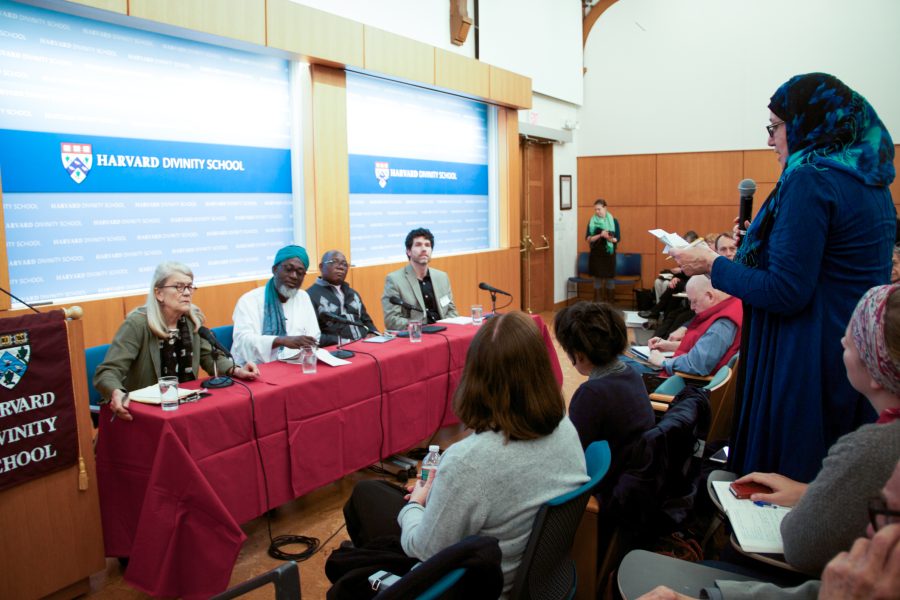On December 10, The Department of Conflict Resolution, Human Security and Global Governance at the University of Massachusetts Boston helped co-sponsor a Religions and the Practice of Peace colloquium with keynote speakers, Imam Muhammad Nurayn Ashafa and Pastor James Movel Wuye from Nigeria.
The colloquium was held at the Harvard Divinity School and was hosted by Diana Eck, who is a director of the Pluralism Project, which focuses on documenting religious diversity in the United States.
Imam Ashafa and Pastor Wuye came to talk about the ways communities in the United States could help promote religious tolerance worldwide and eliminate acts of violence in the name of religion.
Imam Ashafa made three recommendations, included a proposal to Harvard Divinity School to facilitate an inclusive pedagogy for Islam and Peacebuilding curriculum based on seven different components, collaboration between different institutions internationally on this pedagogy, and lastly, creating a platform where religious leaders worldwide can meet and work towards bringing the true “glory of religion” to the world.
Both religious leaders explained their values and gave historical examples of people from the two faiths protecting each other, to show that tolerance is embedded in those two religions. Imam Ashafa gave two examples, which included Abyssinia, modern day Eritrea and Ethiopia, where Christians gave refuge to Muslims, and Saint Catherine’s Monastery in Sinai, which to this day is protected by Muslims because they were commanded to do so by the Prophet Muhammad.
He also quoted chapter Ar-Rum (Rome) from the Quran, claiming that it teaches solidarity with Christians: “A whole chapter is on solidarity with Christian nations. When the Roman Empire fell, the Roman kingdom fell in the hands of the Byzantium, Muhammad put [up] a wall of solidarity and prayed that a Christian Roman empire will get back their freedom from the hand of those oppressors who have crossed over.”
Pastor James Wuye also quoted the Bible to prove that it also teaches love and tolerance for people of all religions. “If you do not make peace with all men, you will not see the Lord.”
The two Nigerian leaders have listed several factors that contribute to igniting ethno-religious conflicts within the country. These include hate speech, lack of knowledge of one’s own and other religions, “demonization” of one another, and absence of communication between different religious leaders.
The imam and the pastor both have put emphasis on hate speech as one of the leading factors that cause much bloodshed in the country. Therefore, they are working on creating a new bill against hate speech:
“Right now we are working on [a] national hate speech bill in our country; we have met with the members of the national assembly and we are working with other state parliamentarians to promote working on a new hate speech [bill resolving the issue],” shared Imam Ashafa.
These two religious leaders have a long history of fighting against each other when they were part of opposing militant groups. As a result, they have both experienced great losses. Imam Ashafa, losing two of his close relatives and Pastor James, his arm.
However, despite this history, they were still able to come together and call on others to do the same, since it is the most beneficial option and is also supported by their religious views. “In Nigeria, we’re competing on who will kill the most. Is it the Christians or the Muslims? After every ethno-religious conflict, we count and we prepare for the next,” continued the pastor, “Trying to outweigh one another in the number of churches we have burned, the number of mosques we have destroyed and the lives we have taken.”
These acts of violence continue as Nigeria is hosting one of the biggest terrorist organizations called Boko Haram. They have captured the world’s attention in April of 2014 by kidnapping almost 300 girls.
Though, it is very dangerous for the pastor, the imam, and anyone in Nigeria to raise their voice for peace with a different ethnic or religious group. They could be seen by some as traitors or compromisers of their religious values. Regardless, the two religious leaders still believe the sacrifices are worth it, as long as the future generation is safe. “We are giving our life as a symbol and as a hope, that if at all, by taking my life, I could save the life of other innocent children. I think it’s worth it,” said Imam Ashafa.

